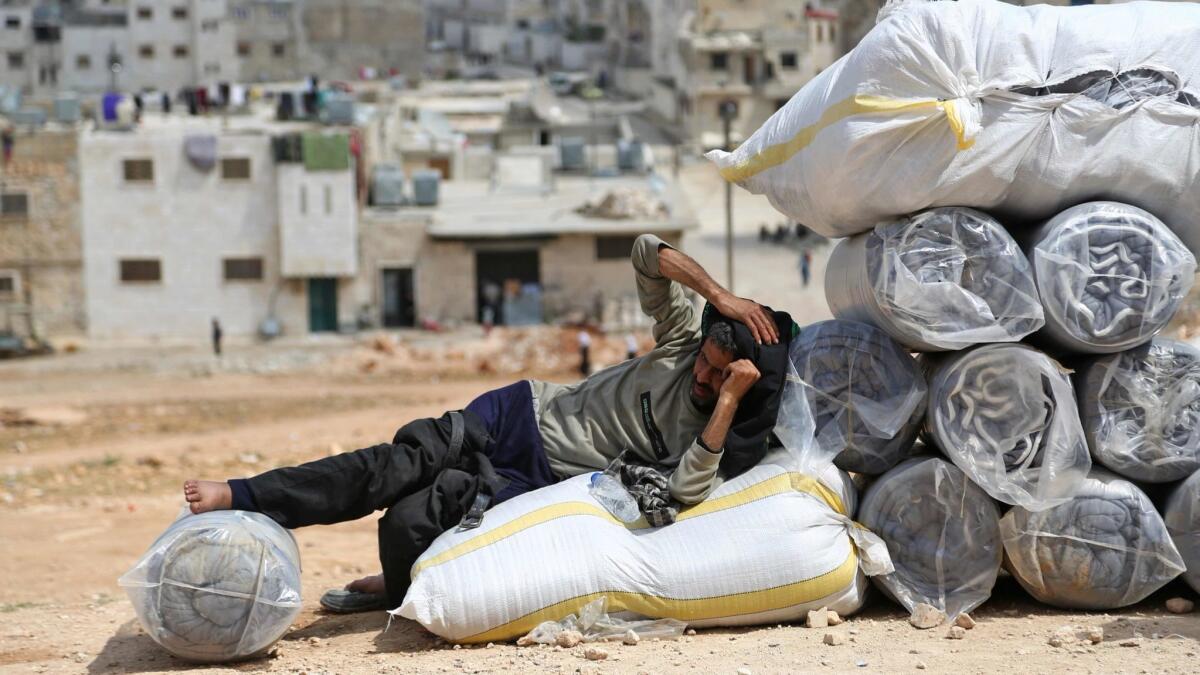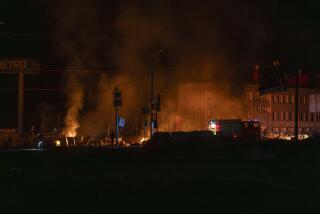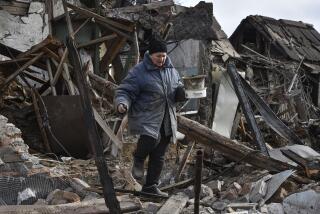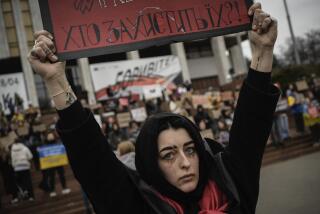Trump says missile strikes in Syria could be soon or not; Syrian troops take control of rebel enclave

President Trump on Thursday appeared to step back from an earlier aggressive stance on firing missiles at Syria, while some European nations debated their participation in any such military strike.
Trump, a day after taunting Russia, a key ally to Syrian President Bashar Assad, about its need to get ready for missile strikes in Syria, seemed to present a lesser sense of urgency about attacks in a new Twitter message.
“Never said when an attack on Syria would take place. Could be very soon or not so soon at all!” Trump tweeted Thursday.
Russia has said it would shoot down any cruise missiles targeting Syrian government and military installations.
Russia’s military Thursday declared that Syrian government troops had taken control of the city of Duma, signaling the end of a wide-scale offensive to take back the rebel enclave in eastern Ghouta.
The announcement by Russia indicated that military police would be deployed Thursday to maintain order in the city, a Damascus suburb where a suspected chemical attack by the Assad government killed dozens of people during the weekend.
The city was in a transitional period toward coming under the control of Syria’s legitimate government, said Maj. Gen. Yuri Yevtushenko, head of Russia’s reconciliation center in the country, according to Russian state news agency Tass.
“Today marked a landmark event in Syria’s history,” Yevtushenko said. “The state flag was hoisted on the Duma building which signaled [Damascus’] control over this settlement and, hence, over all of eastern Ghouta.”
Activists, rescue workers and medical groups have accused Damascus of deploying chemical weapons during a ferocious offensive to subdue opposition fighters in Duma.
Damascus and Moscow vehemently denied responsibility for any gas attack and asked the Organization for the Prohibition of Chemical Weapons to inspect the site of the purported chemical strike, an invitation the group accepted Tuesday.
Many observers had expected an imminent missile strike after Trump tweeted Wednesday “Get ready. . . because they will be coming, nice and new and ‘smart!’”
The pro-opposition Syrian Observatory for Human Rights, a Britain-based war monitor which tracks the violence in Syria via local activists, said concerns about a missile attack led to an alert for loyalist forces to abandon their bases.
Danny Makki, a Damascus-based journalist, said military airports, including Dumair, Shayrat and T4 had been emptied, with the bulk of the government’s air power moved to Russian bases or other secure locations.
French President Emmanuel Macron, who has repeatedly marked chemical weapons use as a “red line,” insisted in a television interview with TF1 channel that Paris had proof that chemical weapons were used by the Assad government. He did not elaborate.
Macron said a decision to strike would need to be taken “in due course, when we judge it most useful and effective.”
German Chancellor Angela Merkel said during a news conference she would support a signal “that this use of chemical weapons is not acceptable,” according to a report in Die Welt. She maintained her country would not take part in military action.
The BBC reported British Prime Minister Theresa May had summoned her Cabinet to discuss a possible strike.
Meanwhile, a defiant Assad, in a meeting with a delegation from ally Iran led by Ali Akbar Velayati, top advisor to Iran’s supreme leader Ayatollah Ali Khamenei, said the threats of an attack by the West were “based on the lies fabricated by these countries” and their proxies in Syria, according to a report by the state’s Syrian Arab News Agency, or SANA.
“Whenever the Syrian army achieves victory in the field, some Western countries rise [sic] their voices and intensify their movements in an attempt to change the track of events,” Assad said, adding that these maneuvers would “further destabilize the region.”
Syrian state and pro-government media did not announce Duma’s capture from rebels, but SANA displayed pictures of medium-grade arms said to be surrendered by the Army of Islam, the dominant faction in the city.
A SANA report on Wednesday said some 12,000 militants and their families had already left Duma for rebel-held areas in the country’s north, and that evacuation was ongoing.
Nizar Abu Anas, a pro-opposition activist in Duma, said by phone Thursday that buses had entered Duma and were poised to leave once sufficient numbers gathered for evacuation.
The observatory said the Army of Islam had already relinquished its heavy weaponry and had provided maps of minefields as well as the network of tunnels the group had once used to smuggle materiel and supplies into Ghouta.
Observatory head Rami Abdul Rahman and Suad Khabiyah, an opposition journalist in touch with residents in Duma, said some 40 carloads of the Army of Islam’s top commanders had left the enclave Wednesday.
“The Russian police have started to enter,” Abdul Rahman said in a phone interview Thursday.
He said the Army of Islam’s remaining leadership was hastening its departure from the city after residents had broken into the group’s warehouses this week and found tons of food and fuel.
The discovery spurred a wave of anger; Ghouta had suffered under a years-long siege by loyalist forces. Residents had often complained of being deprived of staples like rice and bread, even as they struggled with skyrocketing prices.
Al Mayadeen, a Lebanese broadcaster aligned with Damascus, reported that a top Army of Islam cleric, Abu Abdul Rahman Kaakeh, had left eastern Ghouta on a bus Wednesday night.
A spokesman for Duma’s local council who calls himself Bilal Doumi to guard his safety said in a WhatsApp conversation Thursday there had been no official handover and that there were still fighters as well as a number of commanders who had not left the city.
Doumi also insisted that the Syrian government flag, reviled by the opposition and replaced with an alternative version, had only been briefly hoisted on a building in Duma, when a Syrian government civilian delegation, escorted by Russian military police and media, entered the city Wednesday.
“When the civilian committee came, people gathered before the local council building to see what was going on,” Doumi said. “Some of them shouted pro-government slogans and I didn’t see who raised the flag … after that some of the [Army of Islam] fighters were angry and broke up the gathering.”
The enclave itself, which had been under the sway of a group of Islamist rebel factions since early 2013, stretched into a major square on the outskirts of the capital; the rebels would often conduct surprise attacks and kidnappings in the area.
While their fellow fighters peppered the capital’s eastern neighborhoods with mortar shells and rockets, the government pounded Ghouta with airstrikes.
Bulos is a special correspondent.
Twitter: @nabihbulos
UPDATES:
2:35 p.m.: This article was updated throughout with President Trump’s tweets and other developments.
This article was originally published at 9:10 a.m.
More to Read
Start your day right
Sign up for Essential California for news, features and recommendations from the L.A. Times and beyond in your inbox six days a week.
You may occasionally receive promotional content from the Los Angeles Times.







